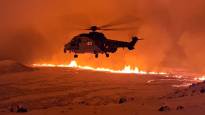According to author Satu Rämö, eruptions like this are not everyday, although the country is used to the phenomena.
The ongoing lava eruption in Iceland has calmed down, but lava will continue to erupt for weeks to come.
A massive lava eruption began in the southwestern part of Iceland late Monday evening. The eruption was preceded by several weeks of strong earthquakes.
The eruption has remained calmer during the night before Wednesday. Lava has flowed from the fissure to the earth’s surface at about 100-200 cubic meters per second, which is many times the amount compared to last year’s eruptions on the peninsula.
However, the lava may still reach the fishing village of Grindavík, where 4,000 residents were evacuated last month. A state of emergency has been declared for the area, but there is no danger to life, according to the authorities. The eruption also has no effect on air traffic.
Ashes and the smell of smoke have been detected 30 kilometers away from the eruption site. BBC reporters describe the earth as shaking from time to time.
Finns living in Iceland Virpi Jokinen and Fairy tale Rämö they say that the country is used to natural phenomena.
If the gases reach Reykjavík, the children will not go outside
Originally from Rauma Virpi Jokinen has lived in Iceland for over 20 years. He says that when a volcanic eruption starts, the most interesting thing is to watch where the gases caused by the eruption go.
Jokinen lives with his family in the capital, Reykjavík. According to him, the situation right now looks favorable in terms of the winds not bringing gases towards the city.
But it is not yet possible to completely know how the situation will progress. The lava eruption is estimated to last at least three weeks.
– Windows would be kept closed, children would not go outside, play school groups would stay inside, babies would not go outside to sleep. If you have asthma or respiratory problems, it is recommended to stay inside, Jokinen tells about the measures to be taken when the gases reach the city.
Jokinen says that over the years it has become routine for him to check which way the wind is blowing first thing in the morning. On Icelandic soil, the exceptionality of the place of residence is well known.
– I notice from my own children how they grow up like this. I woke them up in the morning saying “hey, a volcanic eruption has started”, so they didn’t freak out, says Jokinen.
According to Jokinen, this volcanic eruption is a bit more worrying than other eruptions in the next few years, because it threatens an entire village.
Satu Rämö: “These are not everyday things, are they?”
Author Fairy tale Rämö has also lived in Iceland for twenty years. Rämö’s favorite works, such as last year’s phenomenon Hildur, are set in Iceland.
The situation on the ground in Iceland is calm, Rämö tells Ylen Aamu in a phone interview. He tells how a shelter has been built around the local power plant. A protective fence was also built on the south side of the village of Grindavík.
The events have had the greatest impact on the residents of Grindavik, who have been displaced from their homes for a long time.
– Of course, many hoped to get home for Christmas, says Rämö.
Rämö doesn’t even remember how many volcanic eruptions have occurred during the time he has lived in Iceland. Even this eruption was known to be expected.
– These are not quite everyday, but they do happen here, Rämö says.
